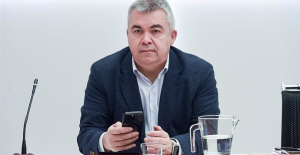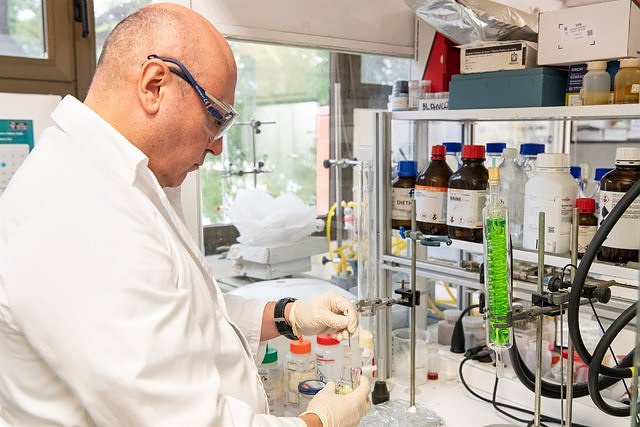VALENCIA, 4 Oct. (EUROPA PRESS) -
A multidisciplinary research team from the Institute of Chemical Technology (ITQ) - a joint center of the Higher Council for Scientific Research (CSIC) and the Universitat Politècnica de València (UPV) - and the Louisiana State University (LSU) in the United States has demonstrated for the first time in breast cancer models the antitumor properties of structural analogues of different natural metabolites.
These findings, published in the journal 'Cancers', suggest the potential of these bioactive compounds for the development of new therapeutic agents against breast cancer.
The CSIC reminds us that breast cancer is one of the most common and deadly diseases in women around the world. Despite advances in diagnosis and treatment, it remains a difficult disease to treat and with a high mortality rate. For this reason, the search for new compounds and therapies is essential to improve the survival and quality of life of patients.
The research work focuses on tanshinone IIA, isolated from the Salvia miltiorrhiza plant, and carnosol, found in rosemary (Salvia Rosmarinus). "Both compounds have shown anticancer activities in laboratory and in vivo tests. However, there are hardly any studies on the pharmacological properties of the structural analogues of these molecules," says Miguel Ángel González Cardenete, CSIC researcher at the ITQ and in a statement. main author of the work.
In their study, ITQ researchers synthesized analogues of tanshinone and carnosol, through a sustainable process from materials from pine resin, while Fátima Rivas's (LSU) team evaluated their antitumor activity in breast cancer cell lines. breast, including triple-negative breast cancer models (without estrogen and progesterone hormone receptors or human epidermal growth factor receptor 2, HER2).
"This subtype of breast cancer is very aggressive, with rapid development and low survival rates, and since it lacks the three most common types of receptors, it does not respond to anti-hormonal or anti-HER2 therapy, which is why there are few chemotherapy treatments. effective and very expensive," says Fátima Rivas, a professor at LSU.
The results showed that several of the analogues inhibited the proliferation of breast cancer cells and increased programmed cell death at very small concentrations and with moderate selectivity indices with respect to non-tumor cells.
These findings suggest the potential of tanshinone and carnosol analogues for the development of new therapeutic agents against breast cancer.
"However, further research is needed to fully understand the underlying mechanisms of action and validate the efficacy of these compounds in animal models and clinical trials before their possible application in the treatment of breast cancer," concludes Miguel Ángel González Cardenete.

 Exploring Cardano: Inner Workings and Advantages of this Cryptocurrency
Exploring Cardano: Inner Workings and Advantages of this Cryptocurrency Seville.- Economy.- Innova.- STSA inaugurates its new painting and sealing hangar in San Pablo, for 18 million
Seville.- Economy.- Innova.- STSA inaugurates its new painting and sealing hangar in San Pablo, for 18 million Innova.- More than 300 volunteers join the Andalucía Compromiso Digital network in one month to facilitate access to ICT
Innova.- More than 300 volunteers join the Andalucía Compromiso Digital network in one month to facilitate access to ICT Innova.-AMP.- Ayesa acquires 51% of Sadiel, which will create new technological engineering products and expand markets
Innova.-AMP.- Ayesa acquires 51% of Sadiel, which will create new technological engineering products and expand markets Mañueco emphasizes that Spain does not want "a president in hiding" and "surrounded by justice"
Mañueco emphasizes that Spain does not want "a president in hiding" and "surrounded by justice" The 'number three' of the PSOE, Santos Cerdán, will appear this week in the Senate commission of the Koldo case
The 'number three' of the PSOE, Santos Cerdán, will appear this week in the Senate commission of the Koldo case The 'Freedom Flotilla' denounces Israel's "sabotage" of its mission and asks for support and dissemination
The 'Freedom Flotilla' denounces Israel's "sabotage" of its mission and asks for support and dissemination 12M.- Díaz: "I ask Mr. Feijóo to stop laminating the politics of our country"
12M.- Díaz: "I ask Mr. Feijóo to stop laminating the politics of our country" How Blockchain in being used to shape the future
How Blockchain in being used to shape the future Not just BTC and ETH: Here Are Some More Interesting Coins Worth Focusing on
Not just BTC and ETH: Here Are Some More Interesting Coins Worth Focusing on UPV students build a prototype of a wooden house to move to Equatorial Guinea
UPV students build a prototype of a wooden house to move to Equatorial Guinea The UA opens the call for the Impulso 2024 Awards for the best innovative business initiatives
The UA opens the call for the Impulso 2024 Awards for the best innovative business initiatives ALI, virtual assistant from Alicante, internationally recognized by the OECD
ALI, virtual assistant from Alicante, internationally recognized by the OECD Retrópolis brings the golden age of video games and computing to the UPV
Retrópolis brings the golden age of video games and computing to the UPV A million people demonstrate in France against Macron's pension reform
A million people demonstrate in France against Macron's pension reform Russia launches several missiles against "critical infrastructure" in the city of Zaporizhia
Russia launches several missiles against "critical infrastructure" in the city of Zaporizhia A "procession" remembers the dead of the Calabria shipwreck as bodies continue to wash up on the shore
A "procession" remembers the dead of the Calabria shipwreck as bodies continue to wash up on the shore Prison sentences handed down for three prominent Hong Kong pro-democracy activists
Prison sentences handed down for three prominent Hong Kong pro-democracy activists ETH continues to leave trading platforms, Ethereum balance on exchanges lowest in 3 years
ETH continues to leave trading platforms, Ethereum balance on exchanges lowest in 3 years Investors invest $450 million in Consensys, Ethereum incubator now valued at $7 billion
Investors invest $450 million in Consensys, Ethereum incubator now valued at $7 billion Alchemy Integrates Ethereum L2 Product Starknet to Enhance Web3 Scalability at a Price 100x Lower Than L1 Fees
Alchemy Integrates Ethereum L2 Product Starknet to Enhance Web3 Scalability at a Price 100x Lower Than L1 Fees Mining Report: Bitcoin's Electricity Consumption Declines by 25% in Q1 2022
Mining Report: Bitcoin's Electricity Consumption Declines by 25% in Q1 2022 Oil-to-Bitcoin Mining Firm Crusoe Energy Systems Raised $505 Million
Oil-to-Bitcoin Mining Firm Crusoe Energy Systems Raised $505 Million Microbt reveals the latest Bitcoin mining rigs -- Machines produce up to 126 TH/s with custom 5nm chip design
Microbt reveals the latest Bitcoin mining rigs -- Machines produce up to 126 TH/s with custom 5nm chip design Bitcoin's Mining Difficulty Hits a Lifetime High, With More Than 90% of BTC Supply Issued
Bitcoin's Mining Difficulty Hits a Lifetime High, With More Than 90% of BTC Supply Issued The Biggest Movers are Near, EOS, and RUNE during Friday's Selloff
The Biggest Movers are Near, EOS, and RUNE during Friday's Selloff Global Markets Spooked by a Hawkish Fed and Covid, Stocks and Crypto Gain After Musk Buys Twitter
Global Markets Spooked by a Hawkish Fed and Covid, Stocks and Crypto Gain After Musk Buys Twitter Bitso to offset carbon emissions from the Trading Platform's ERC20, ETH, and BTC Transactions
Bitso to offset carbon emissions from the Trading Platform's ERC20, ETH, and BTC Transactions Draftkings Announces 2022 College Hoops NFT Selection for March Madness
Draftkings Announces 2022 College Hoops NFT Selection for March Madness























